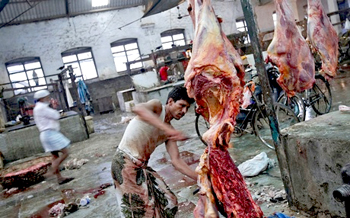Mumbai, Sep 8: The Brihanmumbai Municipal Corporation (BMC) has imposed a four-day ban on the sale of meat in Mumbai during the eight day fasting period of the Jain community.

Earlier, the BMC had imposed an eight day ban on the sale of meat during Paryushan.
But, following an uproar from the other non-vegetarian communities, the corporation gave a nod for a four day ban instead of eight day.
BJP had demanded a ban on sale of meat for the entire fasting period observed by the Jain community, i.e from September 10 to September 17.
Whereas Shiv Sena and other political parties opposed the ban stating that no civic body could decide upon what other people eat.






Comments
Add new comment